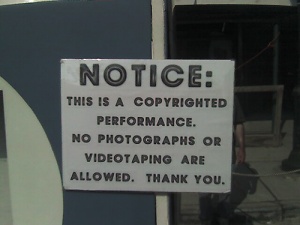Scope of copyright
- You're off to see a production of Shakespeare and see this photo at the entrance of the theatre. Must a creative work be fixed in a tangible form (e.g., print, CD or DVD recording) before it can be protected by copyright? (In this example, the works of Shakespeare are in the public domain and the public performance is not in a fixed form.)
- Yes
- It depends. Many countries require that a work must be fixed before it can enjoy copyright protection, while countries with a civil law tradition may not have this requirement. Check national legislation which may provide protections for performers and broadcasts.
- No
- It depends. If national legislation does not have a requirement for the work to be fixed, copyright protection will take place from the moment the performance is given. Note that national legislation may provide protections for performers and broadcasters as related rights.
- Yes
- Can you take a photograph of a copyrighted work?
- Yes
- Incorrect. Photographing a copyrighted work amounts to reproducing it and as a general rule is not permitted. There are exceptions, for example taking a photograph of a sculpture exhibited in a public place in some countries. You can find more information on photographs and exceptions on the World Intellectual Property Organisation (WIPO) exceptions and practices site.
- No
- Correct. Generally speaking, a photograph is a copy and copying is one of the protections provided by copyright. If the object being photographed is protected by copyright (or other intellectual property rights like trademarks), you may not take a photograph of a protected work. However, there are some exceptions and practices which may be permitted.
- Yes
- Can you copyright an idea, for example, the formula for calculating the area of a triangle in a maths textbook?
$ $- Yes
- Incorrect. Generally speaking, you cannot copyright an idea. It is the layout and format (expression of the idea) which is copyrighted and usually there is a requirement of originality for copyright to apply.
- No
- Correct. It is the expression of an idea which is copyrighted taking into account the requirement for originality.
- Yes
The copyright teaser illustrates two important issues:
- There are certain requirements for a work to qualify for copyright protection; and
- It is important to obtain a copy of your own national copyright legislation to know what conditions apply in your country.
When does a work qualify for copyright protection?
Creative works
Copyright is designed to protect creative works of a literary, scientific or artistic nature. Your national copyright act will provide a detailed listing of the works which qualify for copyright protection but usually include the creative or scientific works of authors, musical works, dramatic works, and works of visual art including paintings, drawings and sculpture, as well as photographic and cinematographic works.
Copyright protects the expression, not the underlying idea
The distinction between ideas and the expression thereof lies at the heart of copyright. So for example, an author may publish a book of recipes on French cooking methods. The copyright of the book does not give an exclusive right to the author to restrict others from publishing the recipe and method for preparing Béarnaise sauce. However, copyright protects others from making an exact copy of the form and style used in the publication. Similarly, you may author a guide on how to edit on WikiEducator, but you may not restrict others from publishing similar guides on the same topic. Under copyright, other users will be restricted from making verbatim copies of your work.
Must works be fixed in a tangible format before they can be copyrighted?
In common law countries, there is usually a requirement that the format is fixed, for example written down, printed or recorded, before copyright can apply. However, many countries which follow civil law traditions do not have this requirement. You should consult your national copyright legislation to determine if fixation is a requirement for copyright protection. Usually, this is not an issue for educators because in most cases you will be working with a source which is fixed in a tangible form, but it is important regarding improvised works of music or dance. Also the protection of cultural and indigenous knowledge is an area of concern for many local and indigenous communities with reference to commercial exploitation without due regard or respect for cultural interests.
The condition of originality
In order for a work to qualify for copyright protection, it must be original. However, there are differences in the interpretation and application of the condition of originality. For example, in common law countries there must be a degree of skill, labour and judgement exercised, while in civil law countries there is an additional requirement that the work should reflect the personality of its creator.
No formalities required
In the majority of countries, copyright protection is automatic and there is no formal requirement to register copyright or to include the copyright symbol or copyright notice to ensure the protections provided by copyright. Therefore, the default position is that creative works are copyrighted as "all-rights reserved", unless stated otherwise.
Any questions?
Remember that if you have any content related questions about this tutorial, please visit our community-based question and answer forum.
Ask OERu is a community-based question and answer support forum. Reward volunteers by voting up useful questions and good answers. Required tag(s): ocl4ed plus copyright For help see: Create account | Update profile | Overview | Tags | Find answers | Ask a question | Karma points | Badges |


